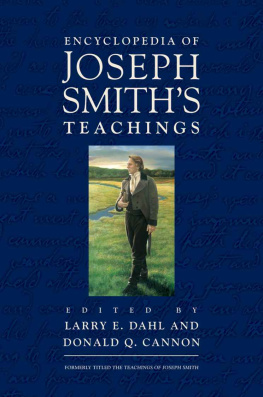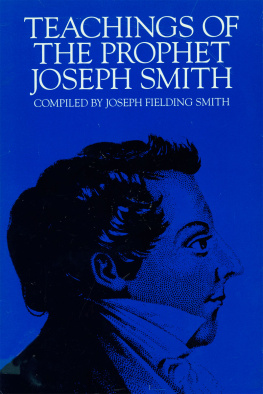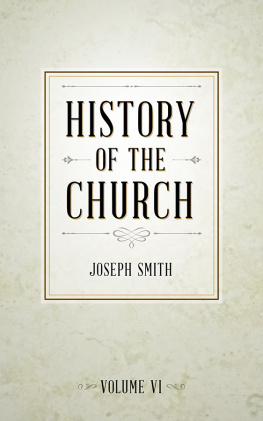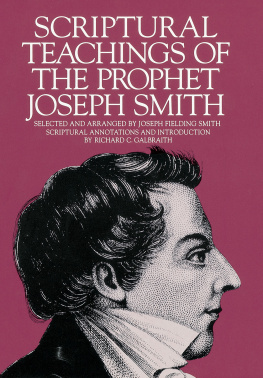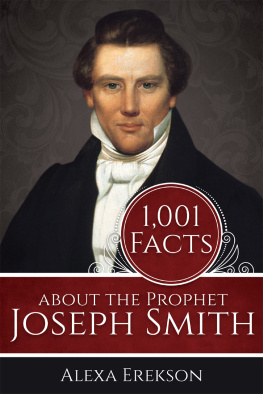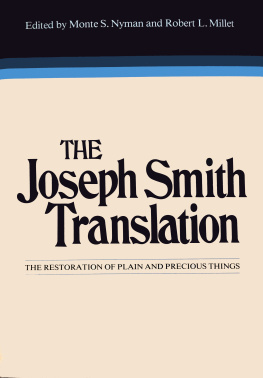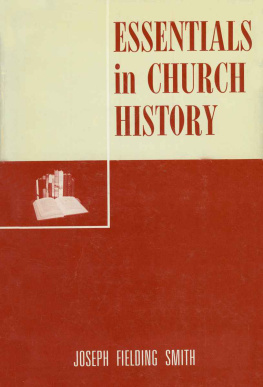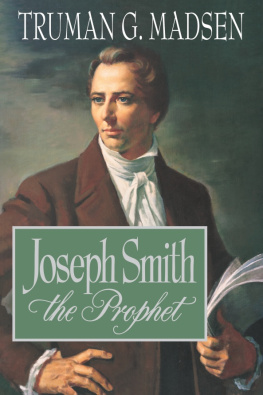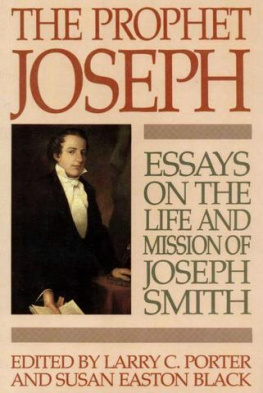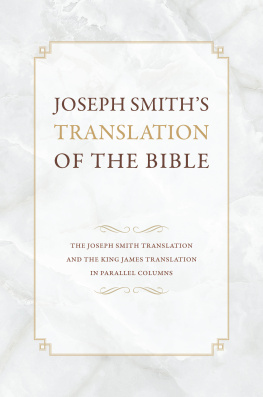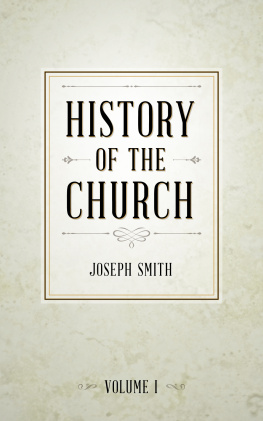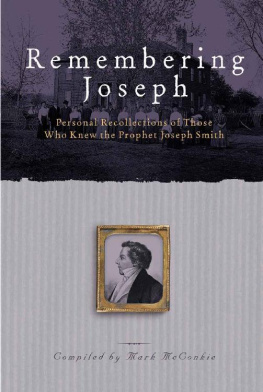Encyclopedia of Joseph Smith's Teachings
Larry E. Dahl, Donald Q. Cannon
1997 Bookcraft, Inc.
All rights reserved. No part of this book may be reproduced in any form or by any means without permission in writing from the publisher, Deseret Book Company, P.O. Box 30178, Salt Lake City Utah 30178. This work is not an official publication of The Church of Jesus Christ of Latter-day Saints. The views expressed herein are the responsibility of the author and do not necessarily represent the position of the Church or of Deseret Book. Deseret Book is a registered trademark of Deseret Book Company.
Introduction
Introduction
As the editors of this work, we hope it will be of value to all those who desire to study about the teachings of the Prophet Joseph Smith. The following introduction includes information about the need for such a work; our procedure and philosophy in compiling the materials; editorial matters requiring explanation; and discoveries we have made while engaged in our study.
Need
Many times over the years, as we have studied about Joseph Smith and his doctrinal teachings, we have asked ourselves, Wouldn't it be wonderful to have a book that would tell us what Joseph Smith taught on any given subject? As we have plowed through what seemed to be acres of material in the existing publications to find a single entry, we have longed for an easier way. This work is the result of that desire to simplify the process of learning about Joseph Smith and what he taught.
Procedure
We have tried to consult all relevant and available sources. A bibliography of source material is included at the back of the work. We have included both sources cited and sources consulted. The principal source has been the History of the Church. This seven-volume publication has been a literal gold mine, filled with precious ideas from the Prophet.
In one sense, our work is an encyclopedia. It is arranged alphabetically and chronologically. Thus, the quotations on faith are listed under the letter F and appear in chronological order. One can readily see what Joseph Smith said or wrote on the subject of faith at different times in his prophetic career. At the end of many sections, following the general chronological presentations, we have placed reminiscent accounts of what others said Joseph taught that cannot be clearly dated.
One of the big tasks in this project has been categorization. When we encountered a quote or concept, we had to decide how to categorize it. We had to ask, for example, should it be under "Last Days," "Millennium," "Signs," or somewhere else? Though some duplication has been necessary in order to round out the various categories, we have tried to keep such duplication to a minimum.
To assist the reader in finding what he or she is looking for, a detailed index has been provided. This index should enable one to find any statement included in the volume either by subject or by any one of a number of key words in the quotation.
Philosophy
In our search of the sources we have tried conscientiously to identify which quotes are from Joseph Smith and which are not. Some that traditionally have been attributed to the Prophet clearly came from William W. Phelps, Sidney Rigdon, Oliver Cowdery, or others. We have made a special effort to include only statements which are Joseph Smith's original ideas or which, if borrowed from others, were clearly stated, written, or endorsed by the Prophet. We have included statements from editorials in the Times and Seasons during the time Joseph Smith was listed as editor, even though there is evidence that some of the editorials may have been composed by John Taylor.
Our philosophy has dictated that we include statements that either define or explain a given subject or term rather than statements that simply contain a single use of a term. Each quotation must clarify the concept and add to our understanding.
We have generally avoided Joseph Smith's statements about other people, except for a limited number of key scriptural figures and a few entries about people close to Joseph, such as Emma. Joseph's characterization of others would make an interesting book by itself.
In the interest of space, and because they are already easily accessible and indexed, we did not include scriptural passages that came through the Prophet. We have chosen to concentrate on oral or written statements from Joseph Smith that are not a part of the standard works.
Occasionally during the selection process we encountered statements that do not seem to fit our present historical and cultural context. These ideas were understood and appropriate in their own time and place, but now either are irrelevant to current circumstances or have been superseded by subsequent prophetic teachings; therefore, we chose not to include them.
We have tried to use concise statements that capture the essence of the Prophet's thinking. Since we have provided historical notes, with dates and places, as well as source references, the reader can easily go to the relevant sources and read the quotations in a broader context.
The main thrust of our selection of statements has been doctrinal. We have preferred principle and application over more esoteric or abstract ideas.
Explanations
Some of our choices in terms of editorial style, designations, and so on may require some explanation. In the interest of readability, where necessary we have chosen to standardize spelling, capitalization, and punctuation rather than leave all the text in its original and often archaic form (the word standardized follows all entries that have been so adjusted).
Sometimes we have standardized or even abbreviated the dating of documents. For example, the letter to the elders of the Church written in September 1835 was published serially in the Messenger and Advocate from September through December 1835. For purposes of simplification and brevity, in the footnotes we have chosen to list the date for all quotations from that letter as 1 September 1835.
Generally we have identified a letter by its recipient, with place of authorship and date. In the case of the letter to Nancy Rigdon we have chosen to use B. H. Roberts's designation of "Essay on Happiness," and on the basis of Dean C. Jessee's writings (see Joseph Smith, The Personal Writings of Joseph Smith, p. 689) we have given the place and date as Nauvoo, 27 August 1842.
Any of our own editorial insertions have been placed within square brackets thus: [the Book of Mormon]. Editorial insertions that are part of the original sources quoted have been placed within braces thus: {co-eternal}.
Discoveries
As we have done the research on this project we have made several significant discoveries. One of the major discoveries, somewhat of a surprise to us, is the realization that the History of the Church is a much more comprehensive source of Joseph Smith's teachings than we had supposed. Despite the publication of new collections such as The Words of Joseph Smith, The Papers of Joseph Smith, and so on, the History of the Church is the single most valuable repository of information about Joseph Smith. It is truly a "documentary" history of the Church because of its valuable collection of all kinds of documents. And because of its general accessibility, we used it as the source whenever the Prophet's teachings were included there.
As our research progressed we found ourselves coming back to certain sources over and over again. The key sources would include Sabbath addresses, funeral sermons, remarks to the Relief Society, and letters to the Church. Recognizing this trend, we asked our research assistant, Robert Bond, to run a computer analysis of the key sources in order to determine the number of hits, or the number of times, we used a particular source. A summary of his evaluation follows:

